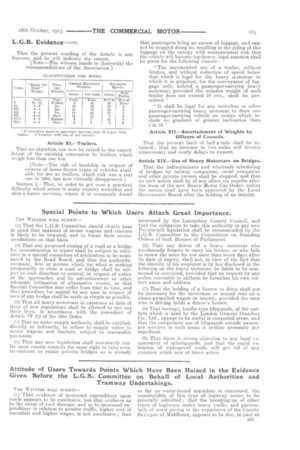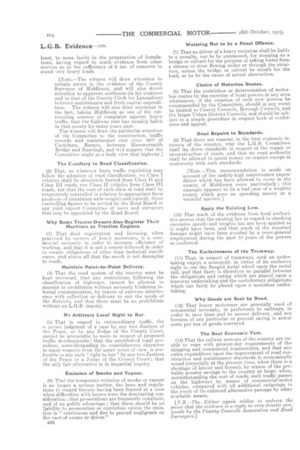Attitude flif Users Towards Points Which Have Been Raised in
Page 3

Page 4

If you've noticed an error in this article please click here to report it so we can fix it.
the Evidence Given Before the L.G.B. Committee on Behalf of Local Authorities and Tramway Undertakings.
THE WITNESS WILL SUBMIT—
(I) That evidence of increased expenditure upon roads appears to be conclusive, but that evidence as to the cause of such damage, and as to increased expenditure in relation to greater traffic, higher cost of materials and higher wages, is not conclusive ; that so far as water-bound macadam is concerned, the unsuitability of this type of highway seems to be generally admitted ; that the breaking-up of other types of highways under heavy traffic, and particularly of wood paving in the experience of the County Surveyor of Middlesex, appears to be due, in part at
least, to some faults in the preparation of foundations, having regard to much evidence from other sources as to the sufficiency of 6 ins, of concrete to stand very heavy loads.
[Note.—The witness will draw attention to certain errora in the evidence of the County Surveyor of Middlesex, and will also direct attention to apparent confusion (in his evidence and in that of the County Clerk for Lancashire) between maintenance and fresh capital expenditure. The witness will also draw attention to the fact, taking Middlesex as one of the outstanding sources of complaint against heavy traffic, that the highway rate has steadily fallen in that county for many years past. The witness will draw the particular attention of the Committee to the construction, traffic records and maintenance cost since 1907 of Castelnau, Barnes, between Hammersmith Bridge and Ranelagh, and will suggest that the Committee might as a body view that highway.] The Corollary to Road Classification.
(2) That, on whatever basis traffic regulation may follow the adoption of road classification, no Class I vehicles shall be absolutely barred from Class II and Class III roads, nor Class II vehicles from Class III roads, but that the user of each class of road shall be respectively controlled in relation to appropriate fixed products of (maximum axle-weight) and (speed), these controlling figures to he settled by the Road Board or any joint expert Committee of users and surveyors that may be appointed by the Road Board.
Why Some Tractor Owners Also Register Their Machines as Traction Engines.
(3) That dual registration and licensing, when practised by owners of heavy motorcars, is a commercial necessity in order to increase efficiency of working, and that it is not a course followed in order to escape obligations of other than technical significance, and above all that the result is not damaging to roads.
Maintain Point-to-Point Delivery.
(4) That the road system of the country must be kept universal, that any restrictions, following the classification of highways, cannot be allowed to amount to prohibition without seriously hindering internal communication, by reason of extreme interference with collection or delivery to suit the needs of the districts, and that there must .1,3e. no prohibition without an L.G.B. inquiry.
Ni Arbitrary Local Right to Bar.
(5) That in regard to extraordinary traffic, the a priori judgment of a case by any two Justices of the Peace, or by any Judge of the County Court, cannot be acceptable to users in respect of proposed traffic developments ; that the established legal procedure, notwithstaniing its unsatisfactory character in many respects from the users' point of view, is preferable to any such " right to bar "by any two Justices of the Peace or a Judge of the County Court; that the only fair alternative is in impartial inquiry.
Emission of Smoke and Vapour.
(6) That the temporary emission of smoke or vapour is no longer a serious matter, the laws and regulations in regard thereto having been framed at a time when difficulties with horses were the dominating consideration ; that prosecutions are frequently vexations, and of no public advantage ; that there should be no liability to prosecution or conviction unless the emission is " continuous and due to proved negligence on the nart of owner or driver!'
1322
Watering Not to be a Penal Offence.
(7) That no. driver .of a heavy motorcar shall be liable to a penalty, nor to be summoned, for stopping on a bridge or culvert for the purpose of taking water from a stream or river flowing under or through the structure, unless the bridge or culvert be unsafe for the load, or he be the cause of actual obstruction.
Choice of Motorbus Routes.
(8) That the restriction or determination of motorbus routes by the exercise of local powers in any area whatsoever, if the creation of such new powers be recommended by the Committee, should in any event be limited to County Councils, Borough Councils, and the larger Urban District Councils, and should be subject to a simple procedure in respect both of conference and appeal.
Road Repairs to Standards.
(9) That there are reasons, in the best economic interests of the country, why the L.G.B. Committee shall lay down standards in respect of the repair or reconstruction of roads, and that no road authority shall be allowed to spend money on repairs except in conformity with such standards.
[Note.—This recommendation is made on account of the unduly-high maintenance expenditure which has been allowed to recur in the county of Middlesex more particularly ; this example appears to be a had ease of a wealthy county which goes on spending money in a wasteful manner.]
Apply the Existing Law.
(10) That much of the evidence from local authorities proves that the existing law in regard to checking excessive speeds and weights has not been applied as it might have been, and that much of the reported damage might have been avoided by a more-general employment during the past 10 years of the powers so conferred.
The Exclusiveness of the Tramway.
(11) That, in respect of tramways, such an undertaking enjoys a monopoly, in virtue of its exclusive right to use the flanged metal wheel upon the metal rail, and that there is therefore no parallel between the obligations and rating which are placed upon a tramway undertaking and the contributory obligations which can fairly be placed upon a motorbus undertaking.
Why Goods are Sent by Road.
(12) That heavy motorcars are generally used of commercial necessity, in preference to railways, in order to save time and to ensure delivery, and not because of any particular or general saving in actual costs per ton of goods conveyed.
The Real Economic Test.
(13) That the railway systems of the country are unable to cope with present-day requirements of the shipping and commercial communities, and that any extra expenditure upon the improvement of road construction and maintenance standards is economically sound (especially at the present time, when there is a shortage of labour and horses), by reason of the probable greater savings to the country at large, when, notwithstanding the cost of roads, such traffic passes on the highways by means of commercial-motor vehicles, compared with all additional outgoings n the event of its enforced alternative passage by other available means.
[N.B.—The Editor again wishes to enforce the point that the evidence is a reply to very drastic proposals by the County Councils Association and Road Surveyors.]






















